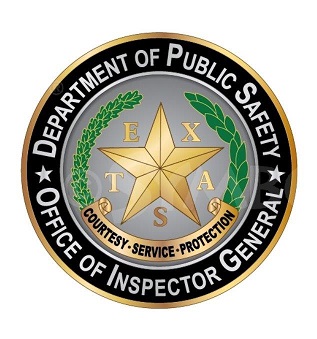Office of Inspector General
Complaint Investigation and Resolution
 It is the policy of the Department to courteously receive and to investigate complaints concerning its employees.
It is the policy of the Department to courteously receive and to investigate complaints concerning its employees.
A person desiring to make a complaint may contact any Department office or the Department's Headquarters in Austin and will be furnished the name and address of the person to whom the complaint should be directed.
Persons desiring to make a complaint must understand the importance of submitting their complaint in writing with their signature affixed. (The Texas Government Code, Section 614.022, provides that all complaints to be considered on law enforcement officers must be in writing and signed by the person making the complaint.)
Persons complaining orally, or by E-mail, will be requested to submit their complaint in writing with their signature affixed if the complaint is on a DPS police officer.
A person refusing to make a written complaint or who makes an anonymous complaint does not necessarily prevent an investigation from being initiated on the facts provided, but does cause the matter to be more difficult to process to an effective conclusion.
Upon receipt of a complaint, a notification will be prepared and sent to the complainant informing him or her that the complaint is to be investigated and that they will be contacted personally, if at all possible, by the investigator to discuss in detail the allegation(s) made against the Department employee.
The Department has two types of complaint investigations, Personnel Complaint Investigations and Division Referrals. A Division Referral may be conducted prior to the filing of a formal complaint. A formal complaint is defined as a formal written allegation against a member of the Department, which could result in disciplinary action up to and including termination, and which alleges one or more of the following:
- An infraction of Department rules, regulations, or policies.
- An illegal act.
Department policy and the Texas Government Code both require a copy of the formal complaint be presented to the employee within a reasonable time and before any disciplinary action may be imposed.
Division referrals are matters that are typically addressed by the Division's management under the guidance of OIG. No division referral is considered closed unless approved by OIG management. Division referrals can result in discipline up to and including a formal written reprimand. Any greater discipline must be administered only through a formal OIG investigation.
Department policy states the investigation of a formal complaint shall include:
- Personally contacting of the complainant by the investigator (when at all possible) to fully discuss the complaint.
- Personally contacting of the accused employee by the investigator in every instance to fully discuss the allegations.
- Personally contacting of all known witnesses as available or necessary.
- The optional recording of complainant, witness, and/or accused employee interviews.
- The taking of sworn statements from complainants, accused employees, and/or witnesses as deemed necessary to support or refute the allegations being investigated.
- Obtaining all known relevant legal evidence and/or other documents to support or refute the allegations being investigated.
- Implementation of scientific investigative aids (laboratory services, etc.) as deemed necessary to support the integrity of the investigation.
- Submission of a detailed investigative report.
The purpose of the investigation is to seek out the facts in a particular situation and to ascertain the truth. The investigation or inquiry may be conducted by a Department supervisor or the Office of Inspector General.
Allegations contained in a formal complaint investigation may have one of four outcomes:
- Unfounded. The allegation is false, not factual.
- Exonerated. The incident occurred, but was lawful and proper or was justified under the existing conditions.
- Not Sustained. There is insufficient evidence to prove or disprove the allegations.
- Sustained. The allegation is supported by sufficient evidence.
A sustained complaint may result in disciplinary action of one or more of the following:
- Formal written reprimand
- Disciplinary probation
- Time off without pay
- Reduction of salary rate
- Demotion
- Discharge
At the conclusion of an investigation conducted by the Office of Inspector General, the report will be reviewed by the accused employee's supervisors, who will attach their recommendations to the report. If a supervisor conducts the investigation, it is reviewed by the employee's supervisors, who attach their recommendations, and then is reviewed by the Office of Inspector General.
At the conclusion of the investigation and all appropriate reviews, the report will be forwarded to the Division Director of the employee, who will take appropriate action, if any, or recommend to the Director of the agency the employee be discharged.
If a formal complaint is sustained against an employee, the employee has the right to appeal that decision and/or the discipline imposed.
At the final conclusion of the complaint investigation or division referral, the complainant and the employee will be given written notification of the outcome. If the process is not complete within 90 days, a status notification will be sent by OIG to both the complainant and the employee.
If a complainant deliberately gives false information causing the Department to conduct an investigation, with the approval of the Director or Deputy Director, this information can be presented to the appropriate prosecutor under the appropriate Texas statutes.
